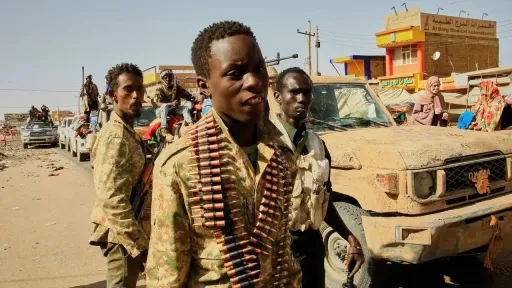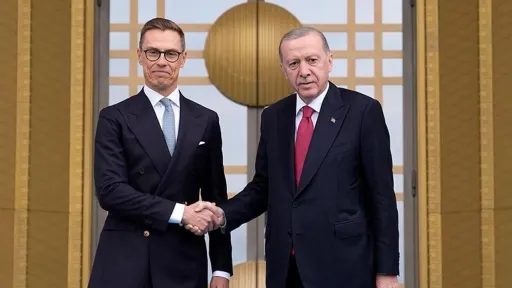By Abdulwasiu Hassan
The spectre of Africa's oppressed past continues to loom over its present.
Sima Luipert, whose great-grandmother was the victim of an assault by a white settler during Namibia's forceful takeover by Germany in the early part of the 20th century, knows what it takes to live with the thought.
"What happened then was an injustice to humanity in general," says Sima, whose family never received reparation for crimes committed against them more than a century ago.
"It (the struggle for reparation) has certainly been a long wait. It is not an event. It is a process," the activist, also an adviser to the Nama chiefs on reparation, tells TRT Afrika.
A dark past
From 1904 to 1908, white German settlers committed genocide against the Nama and Herero people who dared to oppose the occupation of their land. Thousands of people from each of the two communities were killed.
As a fourth generation survivor of the genocide, Sima's window to that horrific period of oppression was through the stories her grandmother shared.
"German entry into Nama and Herero land was a very violent exercise, one whose purpose was really to take the land, and to do so at any cost," Sima says. "If it meant that a genocide had to be committed, Germany was prepared to do that."
She also believes that German Namibians who inherited the lands taken from her ancestors have been "beneficiaries" of the crimes committed against her people.
Sima from Southern Africa isn't the only descendant of dispossessed and displaced people seeking justice from Western countries that sanctioned forceful takeover of lands and the beneficiaries of such depredations.
Peter Kiprotich Arap Bett lives in East Africa, but his angst is no less relevant than Sima's.
Peter is from Kenya's Kipsigi community and a descendant of one among thousands of families whose lands were wrested by white settlers during the British occupation of East Africa.
His grandfather, Tapsimatee Araap Borowo, was among those from the Kipsigis and Talai communities violently evicted from their ancestral land. Worse still, many generations have had to live in abject poverty since.
Peter's primary grouse is that the British government never deemed it necessary to apologise for past injustices formally, let alone pay reparation to the families whose lands were forcefully taken.
When Britain's King Charles visited Kenya recently, people like Peter had expected the monarch to go beyond expressing "the greatest sorrow and deepest regrets" over atrocities committed by British forces in Kenya.
While President William Ruto "courage and readiness to shed light on uncomfortable truths" in the history of interaction between the two countries, "much remains to be done to achieve full reparation," he said.
King Charles isn't the only Western monarch to be criticized in this regard.
During his first official visit to the Democratic Republic of Congo in 2022, Belgium's King Philippe expressed his "deep regret" at colonial atrocities involving his country.
About 10-15 million of Congolese were killed directly or through famine and diseases during Belgium's 23-year rule in Congo – from 1885 to 1908 – when King Leopold II, the brother of King Philippe's great-great-grandfather, ruled the country with an iron hand.
Among the many horror stories from that period are how Congolese villagers risked having their hands amputated if they missed the target set by the colonialists for rubber extraction.
As recently as 2022, the Belgian parliament was still debating whether to use the word "apology" for past crimes by the country in Congo as some feared that would encourage the clamor for reparation.
Will they pay?
The call for reparations is not limited to ordinary African citizens. Those in governments have also been pushing for reparations.
Ghanaian President Nana Akufo Addo told delegates at a summit in Accra last month that reparation needed to be paid to the families of about 12 million Africans forcefully enslaved by Western countries.
"It is time for Africa, whose sons and daughters had their freedom crushed and their ancestors sold into slavery, to receive reparations," he said at the Accra Reparation Conference.
Delegates at the summit agreed to establish a "Global Reparation Fund" to push for overdue compensation for the millions of Africans enslaved during the trans-Atlantic slave trade.
As the calls for reparations get louder, some analysts have little optimism that Western countries involved in slavery and colonial atrocities will pay up.
Prof Kamilu Fagge of Bayero University Kano believes that although the demand is justifiable, the West is unlikely to accept it easily.
"It is legally right because when we talk about justice and law, we talk about three things. The first purpose of a law is to punish any wrongdoing," he tells TRT Afrika.
"The second is to pay or return injustice done to the offended person. Thirdly, it must act as a deterrent to similar wrongs."
Fagge doesn’t accept the argument that the past should be laid to rest.
"Even if we don't get material and monetary payment for the harm that has been done in the past, at least it will be able to give Africa a semblance of closure and provide a bargaining chip for influence in world affairs."
For those like Sima and Peter, reparation is not only a balm on the wounds inflicted by colonial and slavery injustices but also a way of easing the current economic problems confronting their communities.
➤Click here to follow our WhatsApp channel for more stories.
























